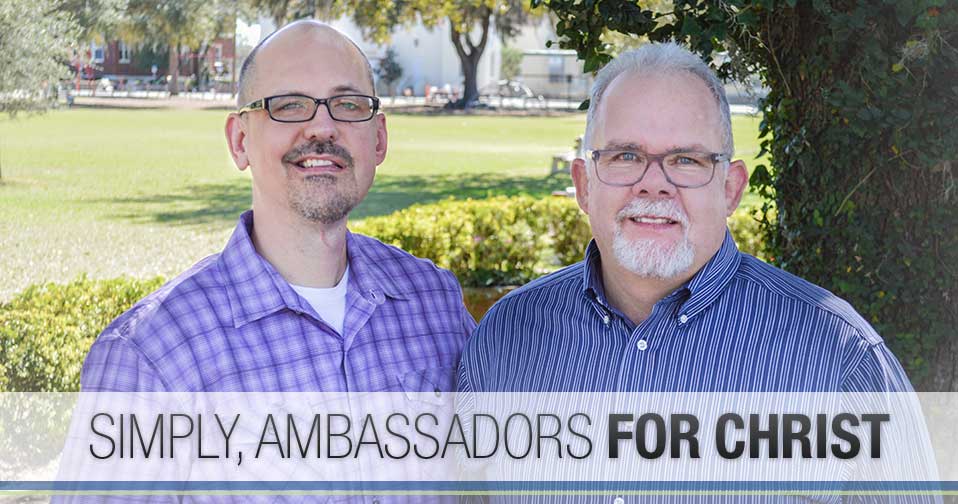The Benham Brothers: Double Measure of Faith

“We need to part ways; we can't go on any longer.” Without commenting any further, that was how HGTV executives of a new reality show called Flip it Forward broke the news to its hosts that the program was canceled six months before its premier.
The brothers, Jason and David Benham, are the sons of evangelical minister Philip "Flip" Benham, and, like their father, actively and boldly expressed their Christian beliefs. When word spread of their upcoming show, the network was bombarded with demands to cancel it from liberal watchdog groups, citing what they perceived as “hate speech” by the Benham brothers. The network caved to their unfounded demands and ended the brothers’ dreams of being reality TV stars. But that has only strengthened their resolve to fight to uphold God’s Word and to withstand the pressures to compromise their faith. They have quickly become leading voices in marketplace ministry through their faithfulness and how they have handled adversity victoriously.
Jason and David grew up in Dallas, Texas, with a Texas-sized competitive spirit. Seldom did they pass up an opportunity to make any activity a race to see who was better, stronger, smarter, or even more favored by their mother. Jason says, “Mom has always liked me more, because David has more of our dad's personality, and she didn't want another husband.” David recalls differently, “If Mom liked Jason more, and she doesn't, it would only be because she felt bad that he's always been slightly chubbier than me.”
When they were young, their father taught them to harness their urge to compete to benefit others and to bring glory and honor to God. They excelled in all athletic endeavors, and during their junior high school years, they were nationally recognized for their basketball, football, and baseball skills. However, baseball was where their passion lay. It was also during this time that they made the choice to accept Jesus Christ as their Lord and Savior, a choice that would change the trajectory of their lives.
In high school the boys honed their athletic abilities and deepened their relationship with the Lord. They were blessed to have Godly coaches and mentors who developed their character on and off the field. By their senior year, six major league baseball teams were scouting them, but their mother insisted that they must attend college. They were both awarded full-ride baseball scholarships to Liberty University, where they earned degrees. After graduating, their dreams of reaching the big leagues came true when the Boston Red Sox drafted David and the Baltimore Orioles drafted Jason. It would be the first time in their lives that they would be going solo.
In their respective training leagues, Jason suffered a compound fracture to his leg, which put an end to his baseball career. After starting off well in the Red Sox training league, David was traded to the St. Louis Cardinals and was moved from the minor league circuit to the major league roster as a catcher. Shortly after moving up the ranks, a batter tipped a foul ball. David quickly removed his mask to snag it while the batter kept following through with his swing, landing it squarely across his nose and breaking it. During his recovery, David was moved back down to the minors and was never able to make up the ground that he’d lost and ultimately left the game that he loved.
For the next chapter in their young lives, the Benham brothers and their young families ended up in Charlotte, North Carolina, and, after they each found jobs there, ended up getting laid off about the same time. Prior to getting laid off, they casually studied and earned their real estate licenses as a means to help each of them locate a house to purchase for their families. With no other opportunities on the horizon, they decided to park their licenses at a small, well-respected real estate firm just north of Charlotte.
With no experience in real estate or even basic home repairs, the brothers hustled to provide for their families by working odd jobs to supplement their commission-only incomes at the realty firm. They were given the opportunity to list three foreclosures from a local bank and jumped at the opportunity. The bank was impressed with their caliber of excellence and performance and steered more foreclosure properties their way, leading them to start their first business. They had earnestly sought God’s will every step of the way, and this was where He led them. The year was 2004, and the real estate market was about to explode.
In the next two years, their business steadily grew, and they were faced with the dilemma of deciding what was most important to them: their money or their time. They agreed that their time was more valuable. With that in mind, it was easy for them to justify hiring people to help them manage their workload rather than working nights and weekends and sacrificing time with their families to keep up with the demand. They also realized that money was not their motivation for growing the business. The brothers approached it from a Biblical basis. They drew upon the principles found in Ezekiel 47, where the Holy Spirit flowed from the Lord’s Temple, represented as a stream of water that provided life-giving food, jobs, and other resources. The brothers viewed their business as a gift from God; not to make them wealthy, but to provide jobs for families and to be a blessing to everyone they encountered.
As more employees were added, they were intentional about investing into the lives of the people they hired. With no formal business training, they relied upon the timeless wisdom found in God’s Word to give them guidance and direction. They felt that if they could do it, anyone could! They recalled, “The most important thing any business leader can do is commit to devouring God's Word. We literally built our businesses on the principles of the Bible, and it worked! If business leaders will capture just one thing...to dive deep into God's Word, it will revolutionize the marketplace.”
Word began to spread about the growth they were experiencing, even to the The Wall Street Journal. They developed a system to streamline their processes that could be replicated in any real estate firm that wanted to get into the foreclosure business. As the real estate market began to collapse in 2007-2008, the foreclosure market exploded. By 2009, they had 100 franchisees in 35 cities and received numerous national awards for their growth and business innovation. They are the first to give all credit to God for any success they have been blessed with.
The success that the Benham Brothers realized opened opportunities to speak to business and entrepreneurial groups across the country. They always had the vision of working until they were able to pursue mission work full-time. As they were speaking to more and more groups, they realized that God had already put them in mission work! They were able to spread their faith, both directly and indirectly, to thousands of people every year through the platform that He gave them.
Still feeling the tug of mission work, they learned of missionaries who were struggling to survive due to lack of funds as a result of the crash in our economy. They thought and prayed about how they could help, and developed an idea they call Missioneering. Rather than simply donating money to missionaries, they approach it as they would any entrepreneurial endeavor. The brothers pool the resources of other companies that can provide the expertise to build the necessary infrastructure to support a facility or village, provide training to make it economically sustainable, and provide a source of income for the local people, while sharing the love of Christ.
In 2012, the Democratic National Convention was hosted in their hometown of Charlotte, North Carolina. God placed a challenge on the brothers’ hearts to capitalize on this opportunity. They were troubled by the moral depravity that had been sweeping our nation and felt that the Convention would give them the perfect opportunity to call God’s people to prayer and repentance. The state of North Carolina had just elected to ban same-sex marriage, and supporters of the ban were being labeled “haters.” The brothers organized a gathering of local pastors and believers, calling it Charlotte 714, as a reference to 1 Chronicles 7:14: “If my people, who are called by my name, will humble themselves and pray and seek my face and turn from their wicked ways, then I will hear from heaven, and I will forgive their sin and will heal their land.”
Over 9000 people attended the event, and David and Jason weren’t sure how their involvement would affect their business; now their faith was on full display. The next day their phones rang off the hook, and new business poured in. God was honoring their obedience! Not everyone was happy. A website devoted to attacking anyone opposing homosexual or pro-choice agendas posted a blog about the event. Even though the message of the event was one of unity and love, the website labeled it as hate speech. The Benhams didn’t think too much about it at the time. Three months later, they received a phone call from the people at HGTV to take part in a reality show. In the show, Flip it Forward, the brothers would show people how to fix up houses and flip them for a profit. They were ecstatic!
The brothers were big fans of the Robertsons of Duck Dynasty, and were thrilled at the prospect of having a similar platform for their faith on HGTV. It was the spring of 2014, and a few months earlier, Phil Robertson was suspended from Duck Dynasty for his views on homosexuality (he was reinstated a week later). David and Jason were upfront with the HGTV executives about their faith, and there weren’t any initial concerns. After they started filming for the show and marketing spots were produced, the show was officially announced. That’s when the network was besieged with complaints about the “hateful” brothers (with references to Charlotte 714). As quickly as it came, the dreams of being on the screens of millions of TV's disappeared.
They recalled their feelings at the time: “Getting fired by HGTV was simply a physical manifestation of what battling the enemy looks like. Speaking for the unborn and defending God's design for marriage made us threats to Satan—so he attacked us as Christ said would happen in the Gospels. Our only role was to simply speak the truth in love and accept the consequences as God saw fit. We're just honored to be in the fight!”
“Although we had plenty of moments where we were fearful and wanted to bow out of the fight, the Lord gave us the strength to stand strong—and He took care of our businesses as well. He'll do the same for you.”
Almost immediately, they were interviewed by dozens of national news outlets who were eager to see how they would handle the devastating news and were surprised to find them giving praise to God. Rather than seeing the departure from HGTV as a failure, they knew that God had even greater things in store for them. They wrote a book about their story called Whatever the Cost and are in high demand to speak to leadership groups and Christian organizations and still actively run their businesses.
Always looking for new opportunities to use the platform God has given them, they are driven to maximize their impact. “We just completed our second book titled, Living Among Lions, which will come out in June. We have several more books in the hopper, but we're not sure which one to tackle next. After we got fired from HGTV, God pivoted our life story, so we try to stay as fluid as we can, always ready for another 'God-pivot.' Before HGTV, we were building businesses and creating jobs. Today we travel the country and encourage people to stand strong for their faith and dive deep in their relationship with Jesus. We've also been engaging many political leaders on the vital role of Christianity in America and how important it is to protect life, marriage, and religious liberty. While doing this, we still buy and remodel houses, as well as build and develop small businesses.”
They eagerly share what they’ve learned with other Christian business owners and leaders, and have developed some guiding principles for those desiring to be more intentional. “We use a three-fold paradigm for marketplace ministry: People, Process, Profits.”
“Your first and foremost ministry is to your people (employees, employers, clients, customers, contractors, and vendors). To do this, you must be the person God's called you to be. This starts with purity of heart and hands, because the pure in heart see God (Matt 5:8). You must also understand that you are a minister of God; you're on a mission for Him everywhere you go, and your work is worship. This naturally puts you in a place of ministry to everyone you contact throughout your day. As a boss or business owner, your people must be shepherded in God's principles throughout their time with you. Your customers and clients also need to know that you will pray for them or help them personally should they ever need you. Your contractors and vendors should know the same as well.”
“The process of your company is a vital ministry tool. If you fail at this, your testimony will be weakened. When you meet the need the customer is paying you for, it qualifies you to meet the need they're not paying you for—a spiritual need they probably don't even know they have. Whether through goods or services, your process of meeting needs must be seen as ministry.”
“The last way to be a marketplace minister is through profits. Unfortunately, this is what most people consider to be the key indicator of using your business as ministry, by donating profits. But that comes last, in our opinion. Faithfully using your profit to advance the Gospel, meet felt needs, and create additional jobs is vital for business leaders to engage in the ministry.”
In the years ahead, the challenges facing Christian business owners will be intensified. They continue, “As America continues to shift from secular to pagan (we moved from Christian to secular decades ago), we believe the greatest challenge for Christian Marketplace leaders in the next 10 years will be how to faithfully engage in business with biblical convictions despite moral/spiritual/political trends against them. For the past two centuries in America, Christian business owners have been rewarded for serving customers and producing products that aligned with their convictions. Today, however, that's rapidly changing. For the first time in our history, it might cost us something to be people of biblical faith at work. The question is, are we willing to remain faithful whatever the cost?”
“In Living Among Lions, we discuss this very point. We highlight the life of Daniel, how he was a valuable solution provider in Babylon, a pagan nation that did not favor his convictions. Yet his faith in God made him a leader and a key player in the nation. But his faith also landed him in the lions' den when the political landscape of the country changed. He stood with courage, and so can we. He didn't just survive in Babylon—he thrived. Regardless of the morally downward trends, we as Christians should consistently be valuable to our customers while remaining faithful to our convictions.”
The Benham Brothers have infectious enthusiasm for their faith, their families, and their businesses, and are living testimonies to a favorite saying of their father by “turning their theology into their biography.” In their book Whatever the Cost, David sums it up best: “God is bigger than any one opportunity, and He may even use your greatest failure as your next platform.”

By: Mark Whitaker
Mark Whitaker is the Executive Editor of TwoTen Magazine. He is inspired daily by his God, his wife Kim and his three daughters Hannah, Sarah, and Rhea.
Read More Articles by Mark Whitaker





